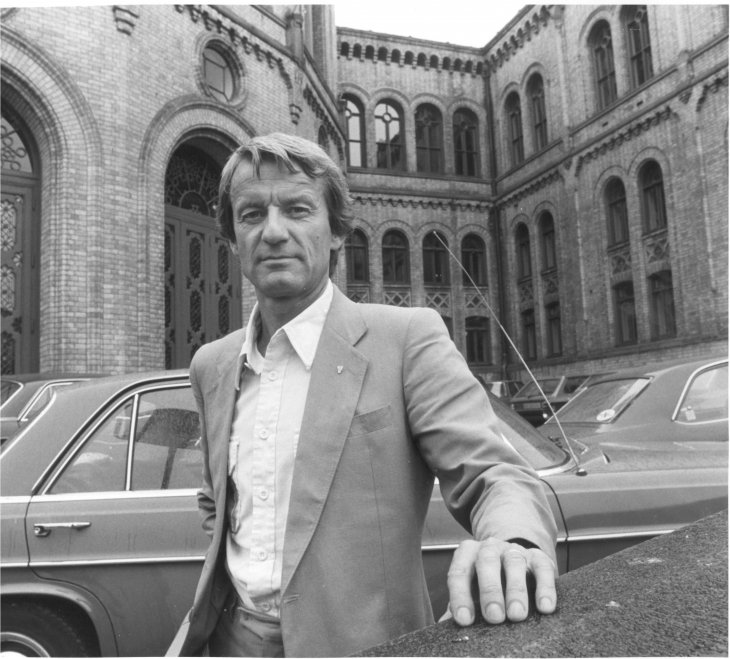
Helge Hveem, ca.1981. Photo: PRIO Photo Archive
Helge Hveem, interviewed by Per Olav Reinton
There is no country that illustrates large-scale violence better than the Democratic Republic of Congo. That is why the Nobel Peace Prize to Denis Mukwege is so well deserved, and why it also affirms the validity of structural violence as a concept. Even if the causes may vary – and physical violence may also breed structural violence – I believe that the DRC demonstrates that physical violence follows from structural violence. Or rather: the two types are interrelated; structural violence makes physical violence easier.
Helge Hveem: My experiences in the Democratic Republic of Congo put me on a path towards the type of theory-driven, but also policy-oriented, empirical research that I followed at PRIO and the University of Oslo, and still pursue. It was a significant day for me when the Congolese doctor Denis Mukwege received the Nobel Peace Prize in 2018.
I had my first political science exams in spring 1961. Then I attended the Norwegian Army’s course in Russian, until the end of 1962, before being recruited into the voluntary UN service. It was well paid, and I saw the possibility of experiencing something unusual at the same time as I financed my future studies.
In 1963, I spent seven months as sergeant at Opération des Nations Unies au Congo (ONUC). I was assisting the head of the air service; the UN was in charge of most of the air traffic in the Democratic Republic of Congo (DRC) at the time. I visited Katanga. I was in the now conflict-ridden areas in East Congo. I visited the budding university. And I understood that this country, independent in 1960, was a victim of geopolitical rivalry and industrial exploitation.
Katanga’s attempt to become independent was influenced and perhaps even directed by foreign mining interests, represented by Forminière and Union Minière in collaboration with local politicians. Foreign secret services and diplomacy were deeply involved.
I was in the now conflict-ridden areas in East Congo. […] And I understood that this country, independent in 1960, was a victim of geopolitical rivalry and industrial exploitation.
There are challenges involved in governing a country of almost the same size as Western Europe, but without Europe’s infrastructure. The Congolese state functions in its own way, even though it breaks down now and then. When “chaos” and “instability” rule, foreign actors are responsible to some extent, in combination with local interests. Geopolitical rivalry, regional conflict and natural resource exploitation afflicted the DRC from its independence in 1960. Foreign mining interests supported the Katanga and Kasai provinces for independence.
The east-west conflict and the UN became part of the DRC’s politics when Patrice Lumumba (1925–60) was elected prime minister and later on executed. When the UN left, the chief of the army Joseph Mobutu (1930–97) took power with US support and governed for 32 years. He plundered the state until it almost collapsed, but used some of what he grabbed to bribe people. Nobody supported him when he left in 1997. The violence that erupted during the years 1998–2003 killed several millions and sent others on the run.
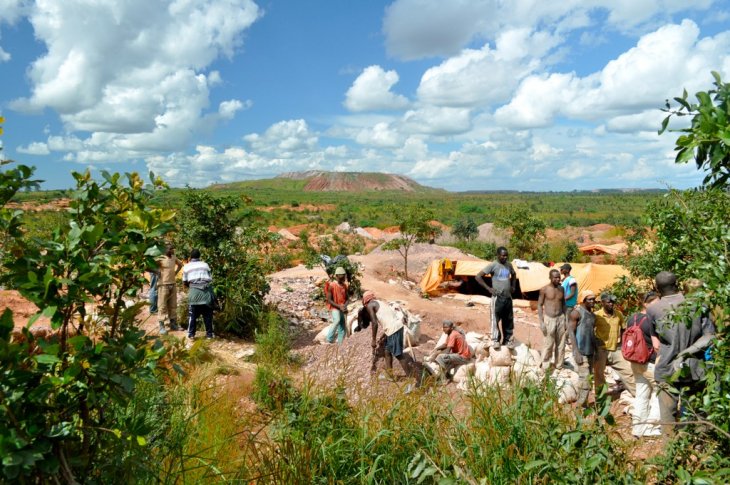
A Gecamines-owned artisanal cobalt mining site in Katanga province, DRC. Photo: Fairphone / CC BY-NC-SA / Flickr
International and national rivalry over resources and their exploitation are forms of structural violence. They were more ruthless when the colony was the private property of King Leopold II of Belgium (1835–1909). But the country has been extremely violent after independence also. National sovereignty is often challenged by external actors through physical violence, in collaboration with local actors: the state authorities are robbed of income from national resources; civilians are killed en masse by groups fighting for power and control; and huge parts of the population are locked in permanent poverty.
Denis Mukwege has described the violence as he observes it in its most personal and sexist misery. He was among the first who observed violence against women as a weapon, and to show us how families and societies are broken down by it. When he puts this form of violence into its political context, he places the responsibility in the DRC capital, Kinshasa. In his acceptance speech in Oslo City Hall on 10 December 2018, he also asked us to look at the “conflict minerals”, particularly those that are so vital to the production of “new” products, such as smartphones, tablets and electric cars.
In that way, he connected the actual violence in the DRC to the exploitation of resources that is recognized as economically-motivated structural violence.
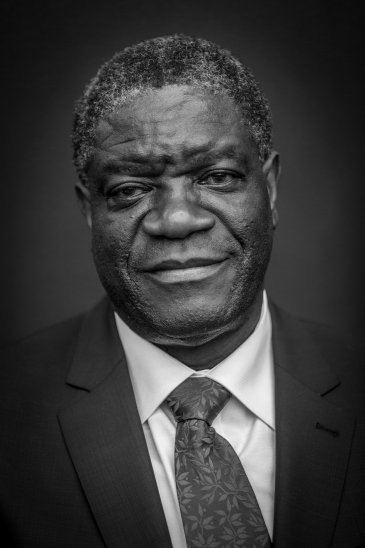
Dr. Denis Mukwege in 2014. Photo: Claude Truong-Ngoc / Wikimedia Commons
The mixture of armed revolt, military peace operations, economic exploitation and geopolitical rivalry in the DRC was my background. I had seen how national politics could be dominated and determined by international structures. I was soon involved in a project that was analyzing UN peacekeeping forces. I had offers from the Norwegian Institute of International Affairs (NUPI) and from PRIO, and chose PRIO because of its exciting and dynamic environment – and one particular researcher who was a stimulating guide.
Per Olav Reinton: And that researcher was Johan Galtung, PRIO’s instigator.
Yes. It was Johan.
What was your impression of him at the time?
He was very stimulating, fascinating and clever, not least in the area of research design and scientific methods. Yet he also had the ability to create and transmit enthusiasm. I studied elites and opinion makers in Norway for my magister thesis, which later became a book, International Relations and World Images. Johan was important for me to construct a good approach – together with other colleagues, of course.
At the same time, you were responsible for the more open and less academic Peace Academy?
I was the secretary of the Peace Academy, in cooperation with Fredskontoret, Sonja Lid and Lars Andreas Larssen. Our friends from the law department participated, like Anders Bratholm, Torstein Eckhoff and Karl Nandrup Dahl. And some generals took part, like Bjørn Egge and Tønne Huitfeldt.
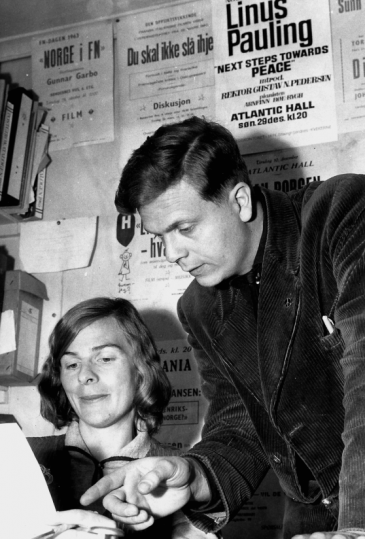
Sonja Lid and Lars Andreas Larssen at Fredskontoret in the 1960s. Photo: Fredskontoret.wordpress.com
These were discussions of a more extrovert kind that were important to PRIO in addition to research activities. Peace research and the institute had a good standing in political circles at the time. This was in the Cold War period, which legitimated the extrovert attitude. Contact and collaboration with the Labor Party was fundamental for PRIO.
Yes, but MPs and other politicians in parties in the political centre of Norway were also important to PRIO at the time. Some persons at the intersection of business and research were vital as well. We must mention Erik Rinde. His father, Sigurd Rinde, had the money, but Erik was a stern supporter, even when the storms arose. And he was helpful with the housing.
Yes, we worked in prominent villas, like Severin Jacobsen’s house, when we were students. The 60s was a golden time. We had goodwill in political circles as well as among those who financed social research. If you look back: what was the most important activity at PRIO?
The seminars were often very interesting. Many competent people attended. And I learned much from Johan in the first years. Less after some years, as we became more and more independently conscious and informed. When Johan developed his extensive social models in the 70s, I learned less from his lectures.
He was a creative man.
Very creative. I learned very much from him in the first years. No doubt.
Who were members of the research staff at that time?
Nils Petter Gleditsch and Tord Høivik. Ingrid Eide, of course, and Mari Holmboe Ruge. Sverre Lodgaard and Kjell Skjelsbæk were recruited at the end of the 60s, together with Asbjørn Eide. Younger people came later, like Stein Ringen, whom I supervised for a master’s thesis on the UN, and I also supervised Ole Kristian Holthe’s thesis on the Ivory Coast. And then we had several foreign guests, among them Tom Biersteker.
Some years later, a colleague of mine asked if he could use my material – my interviews with Norwegian political elites on their opinions and attitudes – but the archives had disappeared from PRIO. They may have been of interest to some of our visitors, and not only the foreign ones, but…
Remember that our most prominent instrument was the stencil machine, a rotary style stencil duplicator, a technology that had its prime time during World War II. PRIO produced tons of stencils. Your material may have disappeared during clean-ups when the institute moved from place to place.
OK. Let us say so. PRIO moved several times.
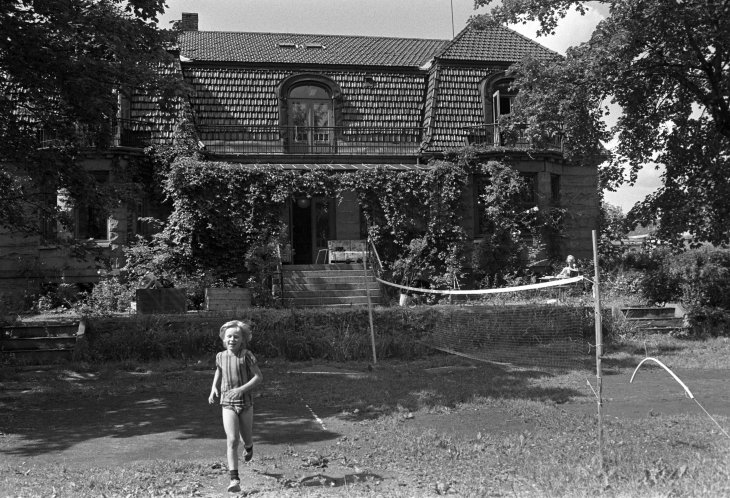
PRIO’s offices at Tidemands gate 28 in 1973. This villa at Frogner was built for the shipping family Onsager. Photo: Ole Christiansen / NTB / Scanpix
But as you say: PRIO had many foreign visitors. How was your contact with them?
They brought me to Uganda in 1969, through the WOMP – World Orders Model Project. It was an interesting group, financed through the Ford Foundation and directed by Saul Mendlowitz and Johan. I was also in contact with Ali Mazrui who invited me to Makerere University in Uganda.
And we had informal Nordic Weeks.
Making friends like Raimo Väyrynen and Peter Wallensteen – and later Björn Hettne. We had the International Peace Research Association (IPRA), which became important.
And Johan Galtung was the hub in all this with his reputation in mathematical sociology and research methods, his contacts and position in prominent research institutions. But then something happened. His position became disputed. You said that his lectures in the 70s were of less interest to you.
But that was not necessarily his fault. I was oriented towards other sources of inspiration, of course. I got new contacts in East Africa – Reginald Green, for instance, who inspired my interest in regional integration.
New International Economic Order was the theme of the day, now almost forgotten, promoted by the United Nations Conference on Trade and Development (UNCTAD). What was that?
You should connect this to the Organization of Petroleum Exporting Countries (OPEC), I think – the 1971–73 oil crisis, as it was called. It was a mobilization for a power shift from the West to the oil-producing countries, actually. Prices increased, production was nationalized in parts of the Middle East.
The mobilization caught the West’s attention, and created some optimism in developing countries at the same time, as an indication that they could change the economic order of the day. Algeria was very active, and was a spearhead. I aimed at this issue from 73–74 onwards. It was an attempt to combine politics and economics, studying what was an endeavor to regulate the world economy in favor of developing countries.
There were strange and unrealistic ambitions involved on second thoughts, but the point was to try to bring producers of raw materials out of the colonial structure. Oil and OPEC became their model example. Regulating the raw material market was the main purpose, but industrialization and technology transfer were also important.
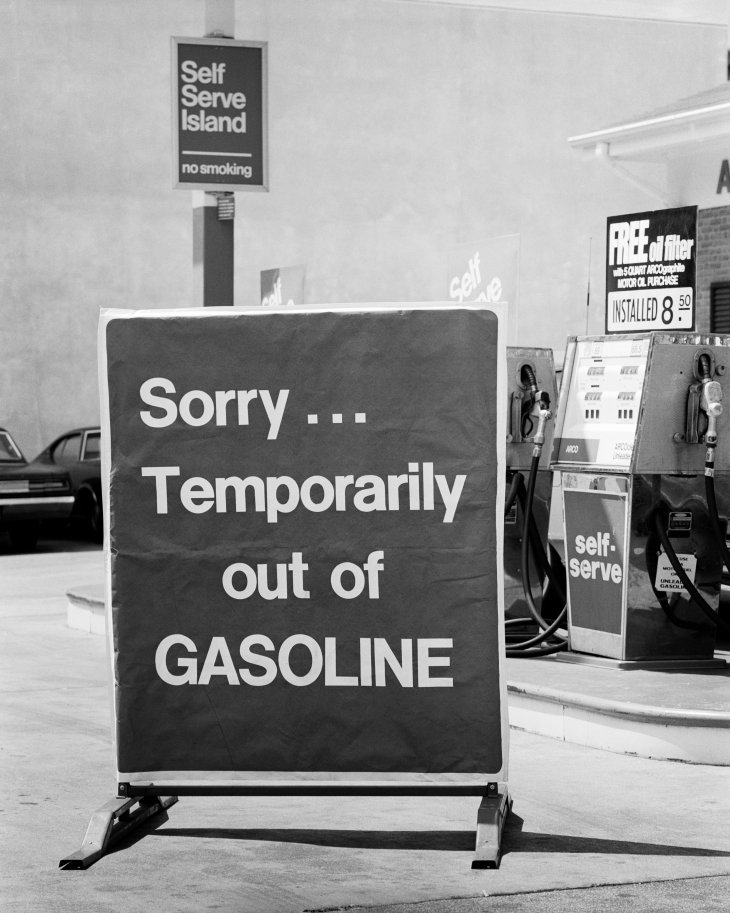
A petrol station out of gasoline in 1973 during the OPEC ‘oil crisis’. Photo: Alamy
The forces behind the coup against Salvador Allende in Chile 9/11 1973 showed that US interests connected to the mining companies were active behind the scenes. My preliminary work from the DRC gave me a push. Norwegian authorities wanted to participate, and I was engaged both at home and abroad. I was invited by an institute in Grenoble to study the markets of raw materials and their political and economic aspects. Later, I was contacted by the secretariat of the United Nations Conference on Trade and Development (UNCTAD) and participated in a consultative group from 74 to 77.
I wrote a book, The Political Economy of Third World Producer Associations. It was a study about the possibility for raw material producers to emulate OPEC. My conclusion was that oil was special. The structure of the oil market was different from the banana market. I also did a popular-scientific book that looked at the international order issues from a Norwegian perspective, En ny økonomisk verdensorden og Norge. Some read it then, but nobody knows it today. It sold out quickly, though, and I travelled around giving lectures and went on TV.
I saw that the problem had to be approached methodically and theoretically on a multi- or cross-disciplinary basis, not only by economists or political scientists. I got acquainted with Susan Strange who had written an article about this in 1970 that I read later. I gave my heuristic contribution in 1973 in the article ‘The Global Dominance System: Notes On A Global Political Economy’.[1]
I was in New York at one of the UN-sessions and met John Ruggie, later professor at Columbia and a leading authority on international political economy. I participated in a group of researchers that published The Antinomies of Interdependence (1982). Ruggie conceived, as United Nations Assistant Secretary-General for Strategic Planning under Kofi Annan, the UN’s framework for international industries’ global responsibility: Global Compact.
In this spirit, you engaged yourself in the Norwegian industries’ bauxite mining in Trombetas in Brazil, assisted by active research assistants.
We looked at two parts of the value chain: the bauxite mining in Brazil, and the production of alumina in Jamaica. It is part of the history that Brazil was a military regime, and Jamaica had a comparatively democratic and progressive regime. So we compared the impact of different political regimes on production and on the behavior of the companies.
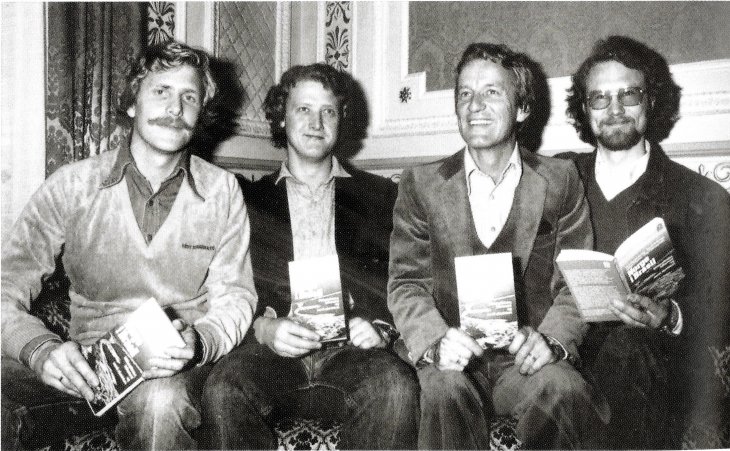
The 1979 launch of ‘Norge i Brasil’ [‘Norway in Brazil’], a book about the Trombetas project, in which two Norwegian producers of aluminium (Norsk Hydro and ÅSV) were engaged. From left: Per Erik Borge; Dan Børge Akerø; Helge Hveem; and Dag Poleszynski. Photo: Unknown.
We started with Brazil, where Årdal og Sunndal Verk (ÅSV) and Norsk Hydro both had a minority share in the Trombetas project. Our research assistants wanted to stay behind the lines – physically – to observe. Officially they went in as bird hunters…
Did this have any influence on Norwegian industrial policy?
Michael Manley was a high-profile prime minister in Jamaica. I had access to Norman Girvan, a researcher who was then the prime minister’s consultant and later director of Jamaica’s National Planning Ministry. There were contacts between the prime ministers in Norway and Jamaica, and I was asked to write a policy paper for the Norwegian prime minister.
The book on the Trombetas project got wide media coverage and was taken up in the Norwegian parliament. The debate ended with Årdal og Sunndal Verk (ÅSV) quitting the project, probably mainly due to political pressure. Norsk Hydro, however, stayed, and has since vastly expanded its presence in Brazil.
We then received further financial support for studying social and environmental consequences of the industry in Jamaica.
At the same time, assisted by Raino Malnes, I had a project for the UN’s commission for disarmament, looking at the great powers’ dependency on imports of raw materials. This culminated in the report ‘Military Use of Natural Resources: The Case for Conversion and Control’, which as a side effect bought me an invitation to the Academy of Sciences in Moscow in the autumn of 1980.
There is a clear continuity in your research, Helge. You started with the Democratic Republic of Congo many years back. When you look back, were the formative years at PRIO exclusively positive?
I grew out of the PRIO environment in the late 1970s. But I kept my interests in the perspectives, research themes and ideas that I absorbed in the 1960s. I appreciate that you say that my work is consistent over time, and I accept that. I have been occupied with power all my professional life, a key concept in political science.
Susan Strange was, like Johan, occupied with structure as a basis of power. On second thought, I see that I have talked too much about “structural power”. I suggested in the 70s that technology was a main power resource in the article ‘The Global Dominance System’ (JPR 1973). Look around today, on platform organizations like Apple, Alphabet (Google), Amazon.
They accumulate capital, pay no taxes, and buy those that have become dependent on their technology. Chinese ICT business institutions grow in the same way, and now they begin to challenge the market power of the American companies. I am satisfied that I pointed at such power resources early, and that I have – as you say – been consistent.
How was your relationship to the concept of peace, PRIO’s raison d’etre at the time of the Cold War?
I met skeptics who asked, “what is this?”, “how can your activities produce peace?” – and I had to defend my platform. I was not dealing with security and military aspects of peace, but found my niche behind the concept of structural violence. International structures contributed to inequality and hence conflict. It was a popular concept at that time, less today.
Was it too wide as an analytical concept?
I can accept that. It could be misused.
We were extremely occupied with power and equality, also in the organization of the institute. When Johan was away, we filled the power vacuum with a very democratic organization, based on the institutional plenary meeting – “Allmøtet” – as the authority with no appeal.
There was consensus as far as the basics were concerned, and the plenary meeting functioned well as long as there was growth and recruitment of people who wanted to contribute in a positive way along the same lines. I did not find the plenary meeting a problem when I was director, since I had the opportunity to take initiatives and decide the agenda since most people were in common agreement about the institute’s goals and how it should be run, at that time.
It was an exciting experiment, but in the 70s, with internal conflicts, it became a problematic structure. Visiting researchers and students had the same vote as the director, and administrative persons the same vote as researchers, also in broad research policy matters.
In addition, we had rotation of certain “quotidian tasks”. I remember one occasion when I was research director and I had to give the final touches to several applications before a tight deadline. In that situation, I was contacted in my office by an administrative person and reproached for not making tea for lunch. My reaction was – to put it mildly – ‘not well received.’
And we had the issues related to equal pay. All employees should be included along the same pay scale – administrative staff as well as researchers. Most were enthusiastic in the beginning, but all the equality ended up in what some called chaotic management.
Some of us left the place. I went to take up a temporary position in the UNCTAD secretariat in Geneva. On arriving back home, I was invited to take a position in the political science department at the University of Oslo – after I narrowly failed to be elected to Parliament by the way…
And we had the issues related to equal pay. All employees should be included along the same pay scale – administrative staff as well as researchers. Most were enthusiastic in the beginning, but all the equality ended up in what some called chaotic management.
When Johan left as professor of peace and conflict research, and a new person was to be appointed, there was a debate about the core of peace research and the relationship between research and policy making. How were the relations between PRIO and the political science environment?
Not necessarily too bad. There was some conflict obviously over not only that issue, but also who was qualified for the position. It is possible that some at the Department of Political Science worked hard to acquire the chair as there were very few new positions at the time. The person who got the position, Øyvind Østerud, is one of our most prominent political scientists and now a good colleague and friend of mine.
I recall, however, that I was in some doubt as to whether his research profile at the time was more relevant for the position than those of applicants from Scandinavian peace research institutions. In my own case, I did certainly not expect to get the position. But I was not even considered for the position as the committee found my profile to be irrelevant for it. So much for my focus on structural violence … I certainly found that strange.
And bonds between PRIO and the political science environment have improved since the roaring 70s.
There was a positive turnabout and change in the atmosphere in the 80s, because of personal relations, but also as a matter of common sense.
Thank you very much, Helge.